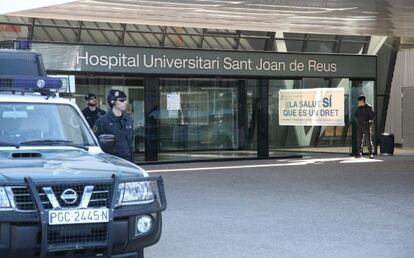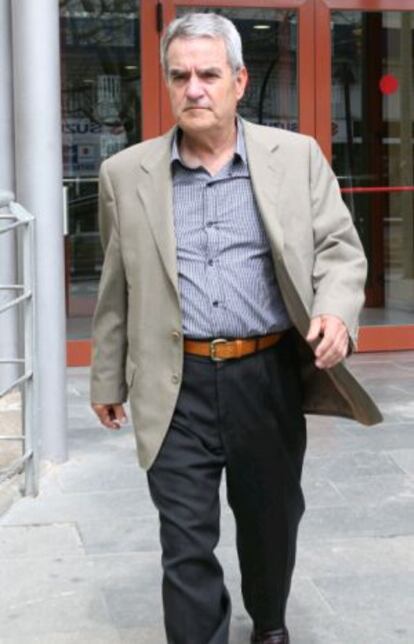Company bribed 30 surgeons into using its orthopedic implants
Scandal is an offshoot of a probe into Traiber, whose faulty products caused a health alert

Around 30 surgeons working in public and private health centers charged hefty commissions for using a specific company’s orthopedic back, hip and knee implants.
Documents accessed by EL PAÍS show that these medics received up to 30 percent of the price of each implant produced by Traiber, a company based in the Catalan city of Reus. Former company workers have privately confirmed the veracity of the information contained in the paperwork.
Make a super collaboration offer, he implants around 80 units a year”
Recommendation by a Traiber sales representative
Traiber is already the target of a criminal investigation for deliberately selling faulty and expired prosthetics to local hospitals after pressuring politicians and doctors. The fact that some of the products caused harm to patients pushed Traiber workers to report their own bosses to the authorities, triggering the probe.
The discovery of this undercover payment system adds a whole new dimension to the ongoing investigation, which led to the arrest of the deputy mayor of Reus, Teresa Gomis. When the scandal broke in May, health authorities placed 6,000 patients who received Traiber implants under observation across Spain.
The paper trail shows how some neurosurgeons and orthopedic surgeons demand and accept bribes —or “royalties” in their own parlance—in a highly competitive world where companies vie with one another to win doctors over.

“This is a sector that handles a lot of money, and purchasing decisions are in just a few hands,” says one former Traiber employee who spoke on condition of anonymity. “This creates the ideal scenario for such practices. It’s tough to say it, but the fact is that in some hospitals it is impossible to sell anything without paying the doctors.”
No fee, no deal
Company archives include notes made by sales representatives who visited dozens of doctors. Some of the remarks illustrate the relationship between medics and makers of medical equipment.
In one note, the Traiber employee sums up the words of the medical chief at a major public hospital in Catalonia, at a meeting held in 2012: “Since there isn’t enough ‛understanding and collaboration’ with you, we’ll buy from another company.”
Later, the same medical chief reportedly said: “Soon [...] just one person will be deciding the purchases for several hospitals, based on the best price offer and also on ‛gifts’.”
Another annotation details a deal reached between Traiber and doctors at a private hospital. “The payment of royalties of €400 (14 percent of the average invoiced value) is established for trauma implants made through insurance mutuals.” If the patient has no insurance and pays out of pocket, the royalty is higher: 22 percent for bills of €4,000 to €4,999, 24 percent for bills between €5,000 and €5,599, and 25 percent for bills €5,600 and higher.
The two most common payment methods were cash and fictitious advisory deals, although Traiber also paid for trips and bought presents
Traiber also offered physicians the possibility of declaring this under-the-table income to tax authorities by passing it off as payment for advisory work.
The ex-employee explains that the two most common payment methods were “cash and fictitious advisory deals, although we also paid for trips and bought presents.”
Traiber archives show dozens of annotations reflecting cash payments made inside offices. Another document shows 2010 payments extended to 11 doctors from the same public hospital. Although all of them received the same amount, €1,500, three of them opted for trips worth that amount, while eight more preferred to pass it off as advisory work and pay the corresponding tax on it.
No trace of advisory work
Sources familiar with the ongoing investigation said that the Civil Guard did not find any trace of advisory work at Traiber headquarters, which were searched in April.
“They only show up as advisors on sales and accounting documents, to make the payments seem legal. But there is no actual scientific or research work to justify them,” said the same source.

The investigating magistrate in charge of the case will subpoena the doctors who show up in Traiber documents in the coming weeks, the source added.
Traiber’s sales archives illustrate how fierce competition for doctors’ favors is. One sales representative wrote: “A €2,500 fee for privately paid implants. I match the offer but he is undecided.”
Representatives also took note of the surgeons with the greatest potential for acquiring orthopedic equipment from them, and made recommendations: “Make a super collaboration offer, he implants around 80 units a year.”
Email exchanges even show how some doctors demanded payment for past operations. A message sent by the head of a private clinic to Traiber owner Lluís Márquez says the following: “I am writing about the hip implant we performed on 10/12/2012 on the patient [...]. We can prepare an invoice for commission purposes, because I have to pay the doctor something by the end of the month.”
English version by Susana Urra.
Tu suscripción se está usando en otro dispositivo
¿Quieres añadir otro usuario a tu suscripción?
Si continúas leyendo en este dispositivo, no se podrá leer en el otro.
FlechaTu suscripción se está usando en otro dispositivo y solo puedes acceder a EL PAÍS desde un dispositivo a la vez.
Si quieres compartir tu cuenta, cambia tu suscripción a la modalidad Premium, así podrás añadir otro usuario. Cada uno accederá con su propia cuenta de email, lo que os permitirá personalizar vuestra experiencia en EL PAÍS.
¿Tienes una suscripción de empresa? Accede aquí para contratar más cuentas.
En el caso de no saber quién está usando tu cuenta, te recomendamos cambiar tu contraseña aquí.
Si decides continuar compartiendo tu cuenta, este mensaje se mostrará en tu dispositivo y en el de la otra persona que está usando tu cuenta de forma indefinida, afectando a tu experiencia de lectura. Puedes consultar aquí los términos y condiciones de la suscripción digital.









































